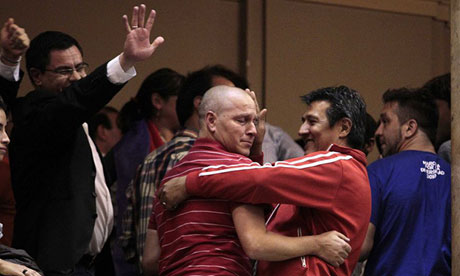By Brendan Oliver Bergh
Impunity Watch Reporter, South America
CARACAS, Venezuela – Hugo Chavez’s handpicked legacy has a lot of work in front of him. As Nicholas Maduro was sworn in earlier this week he already faces immense hardships. Maduro is inheriting food and medical shortages, chronic power outages, one of the world’s highest homicide rates, potential electoral fraud and a constituency that doesn’t respect him.

After Chavez’s death, Hugo seemed like the obvious choice. Vice President and acting President Maduro was poised to retake the presidency as emergency elections were instated. However Maduro lacked the pure charisma that Chavez used to unite the country behind, and many thought he would face problems getting voters back in the booth. Gaffes, and accusations were levied at him by opposition aimed to discredit him and build the base of opposition candidate Henrique Capriles.
A former bus driver, without a college degree, the most telling story that arose from Venezuelan media, was the “very small bird” who gave him his blessing to become President. Maduro told newspapers, that after Chavez’s death a bird in Barinas communicated to him via whistling the spirit of Hugo Chavez, giving him the drive to be President.
Spirituality aside, Maduro was not able to ignite the fire in the voters as Chavez was. Unlike 60+% Win by Chavez over Capriles, Maduro officially beat Capriles by 200,000 votes, or less than 2 percent. Even before the voting had been tallied, many were calling foul play. Stories arose of uncounted votes, ballot boxes thrown in ditches and strong arming from local motorcycle gangs of “Chavistas” or supporters of Chavez.
In order to appease the frantic the dissidents within the country, an audit of the electoral process was demanded and agreed to before Maduro was sworn in, a process that would take approximately a month to complete. Opposition candidate believes there is enough evidence due to the ballot irregularities to believe he has won the election.
The audit was demanded by Capriles, backed by the United States, and urged on by Brazil and the Union of Southern American Countries, insisting that Maduro’s legacy is not shadowed by doubt. The accuracy of the audit however is another issue; many doubt whether it will produce a fair outcome considering Venezuela’s shaky past. In Chavez’ decade and a half reign, individuals were stripped of their right to free speech and due process, lowered the reach of the judiciary, and helped eliminate independent media sources.
For more information, please see:
Wall Street Journal – Latin Leaders Abandon Democracy In Venezuela – 21 April 2013
BBC – Venezuela Election Official Plays Down Vote Audit – 20 April 2013
Fox News Latino – Venezuela’s Maduro Endures Rough Inauguration Day – 20 April 2013
Huffington Post – Nicolas Maduro Assures Hugo Chavez Appeared To Him As A ‘Little Bird’ To Bless Him (VIDEO) – 3 April 2013



